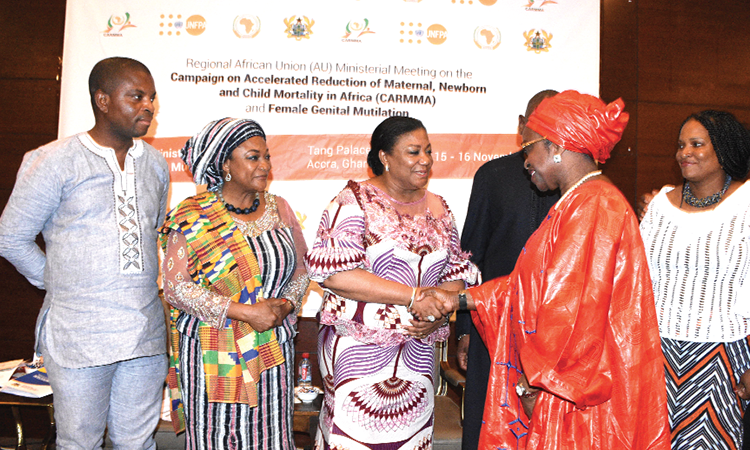
Confab on elimination of FGM in Africa begins in Accra
The United Nations Population Fund (UNFPA) and the African Union (AU) Commission have engaged key stakeholders in discussions on how to accelerate the elimination of female genital mutilation (FGM) in Africa.
The two-day meeting being held in Accra has brought together ministers of Health and Gender from AU member-states , development partners, traditional leaders, victims and other stakeholders to discuss the current situation of FGM on the continent.
The speakers bemoaned that although some interventions had been put in place to end the practice, progress had been very slow.
They expressed worry that FGM was still being carried out and recommended effective continental collaboration to accelerate efforts to eradicate the menace with all urgency.
The meeting is being held on the sideline of the 2017 commemoration of the AU's Campaign on Accelerated Reduction of Maternal Mortality in Africa (CARMMA) and the meeting of the senior management team of the UNFPA, West and Central African Region (WACRO) in Accra.
Slow progress
In his remarks, the UNFPA Regional Director of WCARO, Mr Mabingue Ngom, said it was heartbreaking that the continent was still talking about FGM, when its governments, international community and other stakeholders pledged to join forces to eradicate the menace years ago.
He said FGM remained a clear human right violation that sought to control women’s sexuality and autonomy describing it as one of the many forms of social injustice.
He, therefore, called for a collaboration of all stakeholders to accelerate the elimination of FGM and opined that it was more than possible to do so even before 2030 when the Sustainable Development Goals were expected to be delivered.
First Lady
In her keynote address, the First Lady of the Republic of Ghana, Mrs Rebecca Akufo-Addo, said it was worrying that Africa was still saddled with FGM and underscored the need for deepened and sustained discussions at the continental and national levels to accelerate efforts to eliminate the canker.
She said although a number and variety of interventions had been put in place, much still remained to be done, indicating that the Protocol on the Rights of Women in Africa clearly articulated what governments needed to do to address FGM.
Mrs Akufo-Addo recommended the use of legislation, the creation of new bodies and the strengthening of existing mechanisms to develop and coordinate programmes to end FGM.
However, she said it was widely acknowledged that laws alone could not propel the needed attitudinal change regarding FGM.
“We must use and intensify education and outreach programmes. Government and other stakeholders have an obligation to educate and inform their people about the effects of FGM to help change their attitude to FGM,” she said.
Gender-based violence
In her welcome address, the Minister for Gender, Children and Social protection, Ms Otiko Afisah Djaba, said FGM was one of the manifestations of gender-based violence, describing it as an outrageous act against women’s sexuality and life.
“The sad part is that FGM had no health benefits but rather affected victim’s health and dignity to a large extent,” Ms Djaba said.
“Our gathering here sends a strong signal to perpetrators that Africa frowns on their misdeeds,” she added.
She commended UNFPA and UNICEF for being at the forefront of accelerating programmes and activities towards the eradication of that harmful practice.
Writer’s email [email protected]